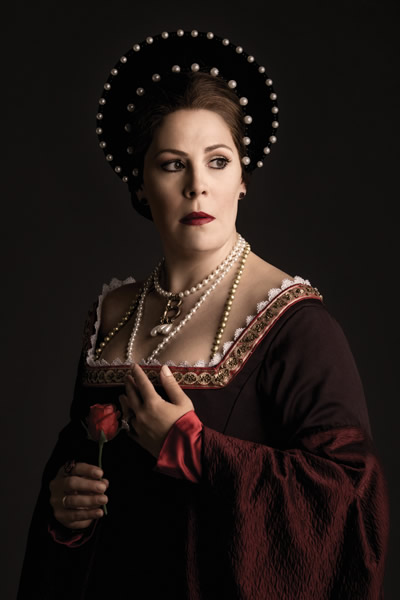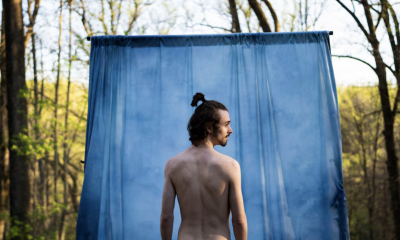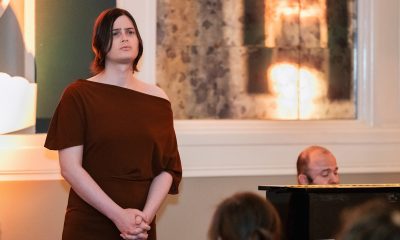Arts & Entertainment
Of queens and minions
Washington National Opera features high-stakes and high-jinks in new season
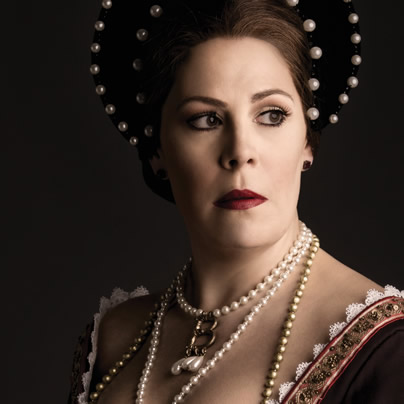
‘Anna Bolena’
Washington National Opera
Sept. 15-Oct. 6
‘Don Giovanni’
Sept. 20-Oct. 13
Kennedy Center
2700 F St., NW
$25-$300
202-467-4600
kennedy-center.org
From epic royals to legendary libertines, Washington National Opera’s 2012-2013 season openers are a perfect fit for capital city audiences mired in a presidential election year.
First out of the gate is Gaetano Donizetti’s “Anna Bolena,” opening Sept. 14. Starring soprano Sondra Radvanovsky in the title role, the 19th-century opera follows the waning days of Anne Boleyn’s reign as Queen of England before being found guilty of adultery and beheaded.
“The opera is amazing dramatically,” says Radvanovsky, “and the music on top of it is just any soprano’s dream.”
Radvanovsky made a name for herself in the dramatic soprano repertoire of Giuseppe Verdi, but in recent years, she started branching out to explore other roles. Often compared to renowned soprano Maria Callas, who revived “Anna Bolena” from near obscurity in the 1950s, Radvanovsky’s voice possess a full-blooded timbre that’s matched by a riveting acting sense, according to her director for this production, Stephen Lawless.
“The intelligence which she brings to the playing of Anna is thrilling and moving,” says Lawless, who’s gay. “She always puts her abilities to the service of the job in hand.”
The opera culminates in a heartbreaking and defiant mad scene for Anna, yet both Lawless and Radvanovsky feel this isn’t the garden-variety hysteria portrayed in other operas, including the same composer’s calling card “Lucia di Lammermoor.”
“She’s emotionally naked,” Radvanovsky says of the queen. “The easy card to put down is to play cuckoo-for-Cocoa-Puffs. Anna Bolena isn’t crazy; it’s just too much for her to handle, and I think that’s something that more people can relate to.”
“She finds inner resources that I suspect she never knew she had,” Lawless says about the doomed queen, adding that her death transforms tragedy into “something glorious.”
DESPITE THE TUDOR-ERA setting for the story, the opera’s themes bear striking relevance to today’s social and political climate. Donizetti contrasts Anna’s undoing with the ascendency of the social-climbing Jane Seymour, who has caught the eye of Henry VIII and will become queen after Anna’s decapitation. However, Anna’s betrayal of a true love from girlhood haunts her throughout out the story, reminding Jane Seymour and audiences that dreams of power can’t buy happiness.
“I started singing when I was 11,” says Radvanovsky. “When I was 18 years old, I said, ‘By the time, I’m 30, I’m going to be singing at the Met.’” This dream came true for the singer, as did her chance to sing with legendary tenor Placido Domingo. She sang with him during “Cyrano de Bergerac” on her 35th birthday, causing her to ask the older legend what she should do now that she’d accomplished her goals.
“He told me, ‘Oh, Sondra. You must go get a new dream.’”
Now in her 40s, Radvanovsky feels that anyone, from the American people trying to choose a president to a young girl aspiring to be queen of 16th-century England, needs to focus on the moment at hand instead of an unpredictable future.
“If [Anna] had lived in the moment, she would have seen that she wasn’t in love with [Henry], but she was looking a year ahead. We are looking into politics in the same way. We put so much hope in these dreams, hoping that Obama or whoever continues down the road we want.”
Lawless, a British native, sees the opera’s connection to today’s audience in a slightly darker hue, recounting how Russian President Vladimir Putin visited the United Kingdom during the recent Olympics. While there, he was asked about Pussy Riot, the female punk band who staged a protest act against Putin weeks before his recent election to the presidency.
“He said, ‘I hope the courts will be lenient with her,’” remembers Lawless, “and that’s exactly a Henry [VIII] statement. It’s that kind of abuse of power that gives this piece its ironic resonance. Henry’s abuse of power should make you as angry as the Pussy Riot thing.”
WASHINGTON NATIONAL OPERA’S next piece, Mozart’s “Don Giovanni,” follows close on the heels of “Anna Bolena” and opens Sept. 20. The infamous womanizer of the title gets his karmic comeuppance by opera’s end, attended throughout by his long-suffering servant, Leporello, played by gay bass-baritone Andrew Foster-Williams.
“I have played it once before, where he was very dark,” he says of the character. “I’ve since come to realize that’s not right. It needs to be multi-layered. We need to remember that it’s a ‘dramma giocoso’ — a dark comedy.”
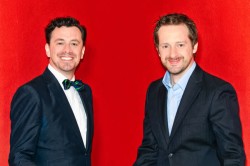
Paul (left) and Andrew Foster-Williams. Andrew plays Leporello in Washington National Opera’s production of Mozart’s ‘Don Giovanni.’ (Photo courtesy WNO)
The singer travels the world with his partner, photographer Paul Foster-Williams, who grew into an avid opera devotee because of his 14-year relationship with Andrew.
“I didn’t come from an opera background,” Paul says. “Now, I would do anything to go and see opera. It gives you the most returns in any art form.”
Paul compares opera with baseball, a realization he came to after going to see a Nationals game while staying in D.C. last spring for Andrew’s turn in “Werther.”
“I had no idea what was going on,” Paul says, laughing. “If you go to the football or soccer game and you don’t know the rules, you might not ever go to another game. It’s the same with opera. The more you experience, the more you get it, the more you will be come absolutely addicted to it, I promise.”
“The reasons people enjoy baseball is because they understand the rules,” Andrew adds. “They learned the rules, therefore they understand the skill of the players.”
The charming British couple hastens to add that opera is performed with translation surtitles projected above the stage, so no one need sit through hours of unintelligible bellowing.
THE FOSTER-WILLIAMSES are clearly a couple who have their own rules down pat. They say they’ve had to develop particular ways of living a life that’s eternally on the road.
“We land in a place,” says Paul. “Andrew goes out and gets provisions. I try to make the apartment feel like a home. We don’t speak to each other at least for a couple of hours.”
“If you’re going to have an argument, it’s then,” Andrew concurs.
“I think some people would end up killing each other,” says Paul. “We’re very lucky. Other people go to separate jobs, and they have separate things to share. What we’re sharing is the discovery of different places together.”
Some productions settle them in a city for a couple of months, while others find them hopping four continents in one week, as it did last spring. After finishing up in D.C., they went to London, Hong Kong and finally Sydney, Australia, which was locked in the grips of winter.
“We had to buy new clothes and leave some new clothes,” Andrew says.
Despite the chaos, the couple remains passionately committed to the arts. Paul’s photography has had to take on a new character, as long-term projects are out of the question now, so he ends up photographing the artists Andrew works with as well as the city locations Paul explores during his partner’s long rehearsal hours.
“Experiencing so much music traveling with Andrew, I think I understand singers well. Singers adapt to each evening, each audience, the atmosphere that evening. It’s so organic, it’s so alive all the time.”
Andrew sums up the role of the artist as an obligation to restoring the humanity to operatic characters.
“This is about making opera real again. The fate of it rests in the hands of the artists singing it.”
Television
ICYMI: ‘Overcompensating’ a surprisingly sweet queer treat
A sweet, savvy show about breaking free to embrace your true self

Pride month 2025 is now behind us, and while it’s safe to say that this year’s celebrations had a darker edge than usual, it’s also true that they came with a particularly rich bounty of new queer movies and shows to entertain us – so many, in fact, that even if we are facing a lull until the fall another harvest of fresh content, there are still plenty of titles – which, for whatever reason, were off your radar – for you to catch up on in the meantime.
One of the most notable of these – the bingeworthy series “Overcompensating” (now streaming on Amazon Prime) – will most definitely have been ON the radar for the plentiful fans of creator and star Benito Skinner, the actor/comedian who rose to viral fame through his content on platforms like Instagram, YouTube, and TikTok. For anyone else, it might have easily slipped through the cracks.
Created and written by Skinner as a loosely autobiographical “college comedy,” it aims for the kind of raucous, explicitly sexed-up tone one expects from the genre as it centers on Benny (Skinner), newly arrived as a freshman at prestigious Yates University. A former football jock and “golden boy” at his midwestern high school, he’s the picture of idealized youthful masculinity; he’s also deep in the closet, struggling to keep his sexuality hidden and maintain his macho front under the intense scrutiny of the college’s social scene – and under the resentful eye of his older sister Grace (Mary Beth Barone), who has already secured her own place at the top of the pecking order.
In the first episode, Benny’s difficulties are eased when he meets Carmen (Wally Baram), another freshman trying to navigate the politics of college life; a gamer from a home marred by tragedy, she’s an outsider who feels like she’s putting on an act, too, and they click – giving him the convenient “cover” of female companionship while providing them both with much-needed support and encouragement. He’s also befriended by a handsome film major from England (Rish Shah), who has already caught his eye, stirring other kinds of feelings and possibly even reciprocating them. Meanwhile, he’s being courted by the school’s “exclusive secret society” – headed by his sister’s aggressively “alpha” boyfriend Pete (Adam DiMarco) – and trying to stay interested in his studies, despite a growing realization that a career in business doesn’t actually appeal to him all that much.
That’s a lot to juggle for anybody, even an overachiever like Benny – whose “lucky” life so far has largely been the result of playing a role he is finding harder and harder to maintain. As the series goes on through its eight-episode arc, it becomes clear that he’s not the only one who is “keeping up appearances,” and he, along with the other confused and damaged young people in his orbit, begins the painful (but often hilarious) process of evolution that is required in order to become truly oneself.
Directed toward appealing to a younger demographic, “Overcompensating” is the kind of show that requires a few episodes worth of invested time to make an impression that feels like substance. Full of the bawdy farcical antics that go hand in hand with stories about hormonally charged college kids, it’s not above leaning into the formulas and tropes that have always driven these kinds of comedies. At first, while its broadly comedic strokes and frequently explicit sexual hijinks might elicit plenty of chuckles, the show might easily feel tiresome for more mature audiences; there’s a nostalgic fun to it, made even more appealing, somehow, by the “political incorrectness” of its frequently sexist and homophobic humor, but for a while things may feel like an unnecessary attempt to reinvent “Animal House” for the Gen Z crowd.
By the time the season reaches its halfway point, however, things have started to get real. The antics of these horny almost-adults take on a more pointed absurdity, informed by the increasingly tangled web of defensive deceit they weave among themselves – and, as things draw toward a cliffhanger climax, the consequences of maintaining it – until it achieves a sense of empathy toward them all. There’s a wisdom that smacks of lived authenticity underlying the whole affair, transforming it from the “sexploitative” teen comedy of its surface into something deeper. To be sure, things stay expectedly wacky, and the soap-operatic melodrama of its twists and reversals continue to maintain the show’s “mature YA” appeal; but beneath those trappings, by the end of the season a truer identity has begun to emerge, just as its characters have begun to find their own levels of self-actualization for themselves.
As creator, primary writer, and star, it’s obviously Skinner who deserves much of the credit. While it might be tempting, early on, to dismiss the show as an “ego project,” the internet-spawned sensation proves his talents quickly enough to get past such judgy suspicions, delivering a pitch-perfect blend of sauciness and sensitivity that extends its appeal toward both ends of the taste spectrum; just as crucially, he brings the same aforementioned “lived authenticity” to his winning performance – after all, he’s essentially playing himself in a fictionalized version of his own life – while also making sure that equal time (and compassion) is afforded all the other characters around him, each of whom are pushing at the boundaries of their own respective “closets,” too. It’s unavoidable to notice that – like most of his co-stars – he’s plainly a decade too old to be playing a college student; but by the time we reach that crucial halfway turning point, we’ve become too engaged by him to care.
The show is full of excellent performances, in fact. Relative newcomers Baram and Barone offer layers of complex nuance, while the more familiar DiMarco (“White Lotus”) is close to heartbreaking as the toxic BMOC clinging to the illusion of power as his life begins unraveling around him. Other standouts include the mononymic actress Holmes as Carmen’s “wild child” roommate, solidly likable turns as Benny’s parents from mature veterans Connie Britten and Kyle MacLachlan (whose presence, along with stylish elements in several key scenes, hints at an homage-ish nod to the late David Lynch), and podcaster Owen Thiele as an openly gay fellow student who has Benny “clocked” from the moment they meet. Finally, Lukas Gage makes a deep impression as a former high school teammate at the heart of Benny’s most haunting memory.
There’s no official word yet on whether “Overcompensating” will be renewed for a second season, despite the multiple loose ends left dangling at the end of its first; it has proven to be popular, and Skinner’s large fanbase makes it likely that the story will continue. Even if it doesn’t, the place of uncertainty in which it has left its characters rings true enough to serve as a satisfying endpoint.
As for us, we hope that won’t happen. For all its sophomoric humor, generic plot twists, and purposefully gratuitous sexual titillation, it’s one of the sweetest, kindest, and most savvy shows we’ve seen about breaking free from conformity to embrace your true self – and that’s a message that applies whether you’re queer, straight, or anywhere in between.
Photos
PHOTOS: Independence Day Weekend in Rehoboth
Wicked Green Pool Party, fireworks among festivities

Vacationers and residents alike enjoyed Independence Day Weekend activities in Rehoboth Beach, Del. The Wicked Green Pool Party drew hundreds to the CAMP Rehoboth fundraiser on Saturday. That evening, revelers went to the rooftops to watch the fireworks display.
(Washington Blade photos by Daniel Truitt)













Music & Concerts
Red, White, and Beyoncé: Queen Bey takes Cowboy Carter to D.C. for the Fourth of July
The legendary music icon performed on July 4 and 7 to a nearly sold-out Northwest Stadium.

Just in time for Independence Day, Beyoncé lit up Landover’s Commanders Field (formerly FedEx Field) with fireworks and fiery patriotism, bringing her deeply moving and genre-defying “Cowboy Carter” tour to the Washington, D.C. area.
The tour, which takes the global icon across nine cities in support of her chart-topping and Grammy-winning country album “Cowboy Carter,” landed in Prince George’s County, Maryland, over the Fourth of July weekend. From the moment Beyoncé stepped on stage, it was clear this was more than just a concert — it was a reclamation.
Drawing from classic Americana, sharp political commentary, and a reimagined vision of country music, the show served as a powerful reminder of how Black Americans — especially Black women — have long been overlooked in spaces they helped create. “Cowboy Carter” released in March 2024, is the second act in Beyoncé’s genre-traversing trilogy. With it, she became the first Black woman to win a Grammy for Best Country Album and also took home the coveted Album of the Year.
The record examines the Black American experience through the lens of country music, grappling with the tension between the mythology of the American Dream and the lived realities of those historically excluded from it. That theme comes alive in the show’s opening number, “American Requiem,” where Beyoncé sings:
“Said I wouldn’t saddle up, but
If that ain’t country, tell me, what is?
Plant my bare feet on solid ground for years
They don’t, don’t know how hard I had to fight for this
When I sing my song…”
Throughout the performance, Beyoncé incorporated arresting visuals: Black cowboys on horseback, vintage American iconography, and Fox News clips criticizing her genre shift — all woven together with voiceovers from country legends like Dolly Parton and Willie Nelson. The result was a multimedia masterclass in storytelling and subversion.
The “Cowboy Carter” tour has been a social media sensation for weeks, with fans scrambling for tickets, curating elaborate “cowboy couture” outfits, and tailgating under the summer sun. At Commanders Field, thousands waited in long lines for exclusive merch and even longer ones to enter the stadium — a pilgrimage that, for many, felt more like attending church than a concert.
One group out in full force for the concert was Black queer men — some rocking “denim on denim on denim on denim,” while others opted for more polished Cowboy Couture looks. The celebration of Black identity within Americana was ever-present, making the concert feel like the world’s biggest gay country-western club.
A standout moment of the night was the appearance of Beyoncé’s 13-year-old daughter, Blue Ivy Carter. Commanding the stage with poise and power, she matched the intensity and choreography of her mother and the professional dancers — a remarkable feat for someone her age and a clear sign that the Carter legacy continues to shine.
It’s been nearly two decades since Beyoncé and Destiny’s Child parted ways, and since then, she’s more than lived up to her title as the voice of a generation. With “Cowboy Carter,” she’s not just making music — she’s rewriting history and reclaiming the space Black artists have always deserved in the country canon.
-

 Federal Government2 days ago
Federal Government2 days agoTreasury Department has a gay secretary but LGBTQ staff are under siege
-

 Virginia3 days ago
Virginia3 days agoDefying trends, new LGBTQ center opens in rural Winchester, Va.
-

 District of Columbia1 day ago
District of Columbia1 day agoGay GOP group hosts Ernst, 3 House members — all of whom oppose Equality Act
-

 Opinions4 days ago
Opinions4 days agoUSAID’s demise: America’s global betrayal of trust with LGBTQ people

